- NEW: Maine official says lack of trust in info from Hickox "makes her a higher risk"
- NEW: She blasts "lack of (federal) leadership"; calls quarantine "common sense"
- NEW: Nurse's lawyer she his client would challenge any court order against her
- Returning health workers should be treated with dignity, Obama says
(CNN) -- Not long ago, Kaci Hickox was fighting Ebola in West Africa, doing what she could to treat those with the deadly disease. Now, she's in the middle of a different fight -- this time, in Maine.
Maine health commissioner Mary Mayhew said late Wednesday afternoon that, even as it continues talks with Hickox's representatives, the state is in the process of filing a court order to require the nurse to abide by a 21-day quarantine. Mayhew cited concerns about Hickox's hands-on role in dealing with Ebola patients, as well as "concerns about the lack of reliability and the lack of trustworthiness in the information that has been received."
"You need to be able to have trust and credibility in that information," the state health commissioner said. "That makes her a higher risk."
Mayhew also blasted what she called "the lack of leadership at the federal level" that has created "a patchwork quilt of state-by-state determinations," vowing that "we will not standby and exacerbate the situation in Maine."
 Nurse refuses Ebola quarantine rules
Nurse refuses Ebola quarantine rules  Nurse facing mandatory quarantine
Nurse facing mandatory quarantine  Obama: The U.S. does not 'run and hide'
Obama: The U.S. does not 'run and hide' 
 Amber Vinson, one of the two Dallas nurses who were diagnosed with Ebola, embraces Emory University Hospital epidemiologist Dr. Bruce Ribner after being discharged from the Atlanta hospital on Tuesday, October 28. Vinson and the other nurse, Nina Pham, have both been declared Ebola-free.
Amber Vinson, one of the two Dallas nurses who were diagnosed with Ebola, embraces Emory University Hospital epidemiologist Dr. Bruce Ribner after being discharged from the Atlanta hospital on Tuesday, October 28. Vinson and the other nurse, Nina Pham, have both been declared Ebola-free.  Kaci Hickox, who recently returned to the United States after working in Ebola-ravaged West Africa, sent CNN this image of the tent where she was being isolated for Ebola monitoring Sunday, October 26, in New Jersey. Hospital officials told CNN the indoor tent is in a climate-controlled extended-care facility adjacent to a hospital. Hickox was eventually discharged after testing negative for Ebola twice.
Kaci Hickox, who recently returned to the United States after working in Ebola-ravaged West Africa, sent CNN this image of the tent where she was being isolated for Ebola monitoring Sunday, October 26, in New Jersey. Hospital officials told CNN the indoor tent is in a climate-controlled extended-care facility adjacent to a hospital. Hickox was eventually discharged after testing negative for Ebola twice. 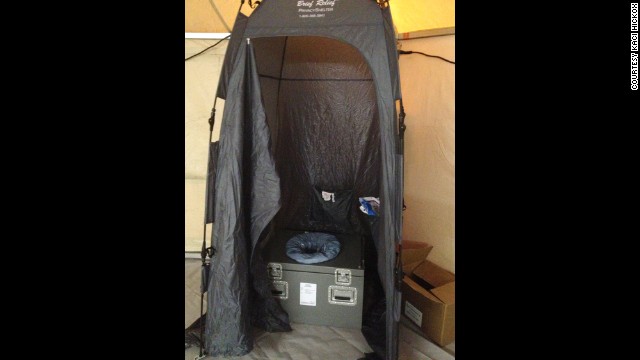 Hickox also sent this image of the toilet facilities in the tent.
Hickox also sent this image of the toilet facilities in the tent.  U.S. President Barack Obama hugs Ebola survivor Nina Pham in the Oval Office of the White House on Friday, October 24. Pham, one of the two Dallas nurses who were diagnosed with the virus, was declared Ebola-free after being treated at a hospital in Bethesda, Maryland.
U.S. President Barack Obama hugs Ebola survivor Nina Pham in the Oval Office of the White House on Friday, October 24. Pham, one of the two Dallas nurses who were diagnosed with the virus, was declared Ebola-free after being treated at a hospital in Bethesda, Maryland.  Police officers on Thursday, October 23, stand outside the New York City apartment of Craig Spencer, a Doctors Without Borders physician who recently returned from West Africa and tested positive for Ebola. Health officials say the Ebola outbreak in West Africa is the deadliest ever. More than 4,800 people have died there, according to the World Health Organization.
Police officers on Thursday, October 23, stand outside the New York City apartment of Craig Spencer, a Doctors Without Borders physician who recently returned from West Africa and tested positive for Ebola. Health officials say the Ebola outbreak in West Africa is the deadliest ever. More than 4,800 people have died there, according to the World Health Organization.  Health workers in Port Loko, Sierra Leone, transport the body of a person who is suspected to have died of Ebola on Tuesday, October 21.
Health workers in Port Loko, Sierra Leone, transport the body of a person who is suspected to have died of Ebola on Tuesday, October 21.  RoseAnn DeMoro, executive director of the California Nurses Association and National Nurses United, talks to reporters in Sacramento, California, after meeting with Gov. Jerry Brown to discuss the Ebola crisis on October 21.
RoseAnn DeMoro, executive director of the California Nurses Association and National Nurses United, talks to reporters in Sacramento, California, after meeting with Gov. Jerry Brown to discuss the Ebola crisis on October 21.  Health workers bury a body on the outskirts of Monrovia, Liberia, on Monday, October 20.
Health workers bury a body on the outskirts of Monrovia, Liberia, on Monday, October 20.  Christine Wade, a registered nurse at the University of Texas Medical Branch, greets Carnival Magic passengers disembarking in Galveston, Texas, on Sunday, October 19. Nurses met passengers with Ebola virus fact sheets and were available to answer any questions. A Dallas health care worker was in voluntary isolation aboard the cruise ship because of her potential contact with the Ebola virus. She had shown no signs of the disease, however.
Christine Wade, a registered nurse at the University of Texas Medical Branch, greets Carnival Magic passengers disembarking in Galveston, Texas, on Sunday, October 19. Nurses met passengers with Ebola virus fact sheets and were available to answer any questions. A Dallas health care worker was in voluntary isolation aboard the cruise ship because of her potential contact with the Ebola virus. She had shown no signs of the disease, however.  Garteh Korkoryah, center, is comforted during a memorial service for her son, Thomas Eric Duncan, on Saturday, October 18, in Salisbury, North Carolina. Duncan, a 42-year-old Liberian citizen, died October 8 in a Dallas hospital. He was in the country to visit his son and his son's mother, and he was the first person in the United States to be diagnosed with Ebola.
Garteh Korkoryah, center, is comforted during a memorial service for her son, Thomas Eric Duncan, on Saturday, October 18, in Salisbury, North Carolina. Duncan, a 42-year-old Liberian citizen, died October 8 in a Dallas hospital. He was in the country to visit his son and his son's mother, and he was the first person in the United States to be diagnosed with Ebola.  An airplane carrying Nina Pham arrives at an airport in Frederick, Maryland, on Thursday, October 16. Pham is one of the two nurses who were diagnosed with Ebola after treating Duncan. Pham was sent to Maryland to be treated at a National Institutes of Health hospital, and she was declared Ebola-free several days later.
An airplane carrying Nina Pham arrives at an airport in Frederick, Maryland, on Thursday, October 16. Pham is one of the two nurses who were diagnosed with Ebola after treating Duncan. Pham was sent to Maryland to be treated at a National Institutes of Health hospital, and she was declared Ebola-free several days later.  Boys run from blowing dust as a U.S. military aircraft leaves the construction site of an Ebola treatment center in Tubmanburg, Liberia, on Wednesday, October 15.
Boys run from blowing dust as a U.S. military aircraft leaves the construction site of an Ebola treatment center in Tubmanburg, Liberia, on Wednesday, October 15.  Aid workers from the Liberian Medical Renaissance League stage an Ebola awareness event October 15 in Monrovia. The group performs street dramas throughout Monrovia to educate the public on Ebola symptoms and how to handle people who are infected with the virus.
Aid workers from the Liberian Medical Renaissance League stage an Ebola awareness event October 15 in Monrovia. The group performs street dramas throughout Monrovia to educate the public on Ebola symptoms and how to handle people who are infected with the virus.  U.S. President Barack Obama speaks to the media about Ebola during a meeting in the Cabinet Room of the White House on October 15. Obama said his administration will respond to new Ebola cases "in a much more aggressive way," taking charge of the issue after the second Texas nurse was diagnosed with the disease.
U.S. President Barack Obama speaks to the media about Ebola during a meeting in the Cabinet Room of the White House on October 15. Obama said his administration will respond to new Ebola cases "in a much more aggressive way," taking charge of the issue after the second Texas nurse was diagnosed with the disease.  A U.S. Marine looks out from an MV-22 Osprey aircraft before landing at the site of an Ebola treatment center under construction in Tubmanburg on October 15. It is the first of 17 Ebola treatment centers to be built by Liberian army soldiers and American troops as part of the U.S. response to the epidemic.
A U.S. Marine looks out from an MV-22 Osprey aircraft before landing at the site of an Ebola treatment center under construction in Tubmanburg on October 15. It is the first of 17 Ebola treatment centers to be built by Liberian army soldiers and American troops as part of the U.S. response to the epidemic. 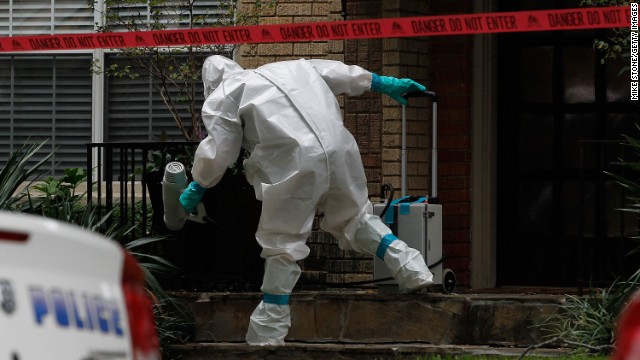 A man dressed in protective clothing treats the front porch of a Dallas apartment where one of the infected nurses resides on Sunday, October 12.
A man dressed in protective clothing treats the front porch of a Dallas apartment where one of the infected nurses resides on Sunday, October 12. 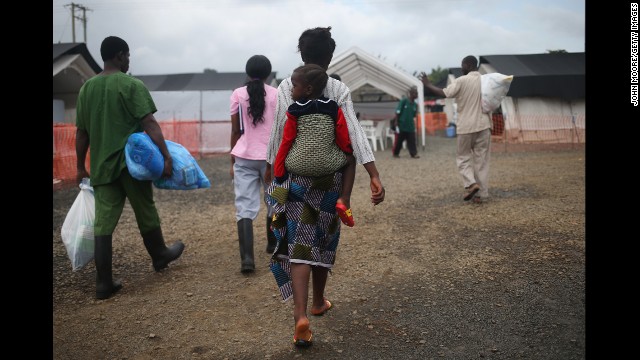 Ebola survivors prepare to leave a Doctors Without Borders treatment center after recovering from the virus in Paynesville, Liberia, on October 12.
Ebola survivors prepare to leave a Doctors Without Borders treatment center after recovering from the virus in Paynesville, Liberia, on October 12.  A member of the Liberian army stands near a U.S. aircraft Saturday, October 11, in Tubmanburg.
A member of the Liberian army stands near a U.S. aircraft Saturday, October 11, in Tubmanburg.  A woman crawls toward the body of her sister as a burial team takes her away for cremation Friday, October 10, in Monrovia. The sister had died from Ebola earlier in the morning while trying to walk to a treatment center, according to her relatives.
A woman crawls toward the body of her sister as a burial team takes her away for cremation Friday, October 10, in Monrovia. The sister had died from Ebola earlier in the morning while trying to walk to a treatment center, according to her relatives.  Ebola survivor Joseph Yensy prepares to be discharged from the Doctors Without Borders treatment center in Paynesville, Liberia, on Sunday, October 5.
Ebola survivor Joseph Yensy prepares to be discharged from the Doctors Without Borders treatment center in Paynesville, Liberia, on Sunday, October 5.  Sanitized boots dry at the Doctors Without Borders treatment center in Paynesville on October 5.
Sanitized boots dry at the Doctors Without Borders treatment center in Paynesville on October 5.  Residents of an Ebola-affected township take home kits distributed by Doctors Without Borders on Saturday, October 4, in New Kru Town, Liberia. The kits, which include buckets, soap, gloves, anti-contamination gowns, plastic bags, a spray bottle and masks, are meant to give people some level of protection if a family member becomes sick.
Residents of an Ebola-affected township take home kits distributed by Doctors Without Borders on Saturday, October 4, in New Kru Town, Liberia. The kits, which include buckets, soap, gloves, anti-contamination gowns, plastic bags, a spray bottle and masks, are meant to give people some level of protection if a family member becomes sick.  A person peeks out from the Dallas apartment where Thomas Eric Duncan, the first person diagnosed with the Ebola virus in the United States, was staying on Friday, October 3.
A person peeks out from the Dallas apartment where Thomas Eric Duncan, the first person diagnosed with the Ebola virus in the United States, was staying on Friday, October 3. 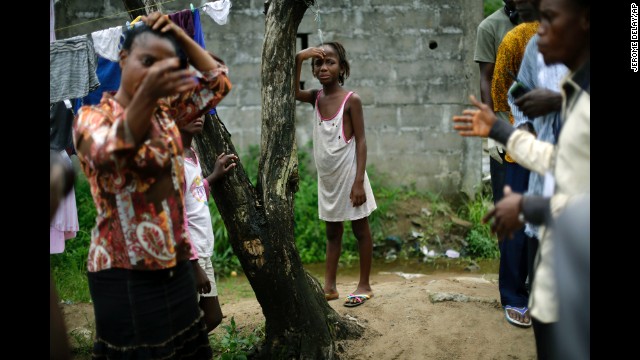 A girl cries as community activists approach her outside her Monrovia home on Thursday, October 2, a day after her mother was taken to an Ebola ward.
A girl cries as community activists approach her outside her Monrovia home on Thursday, October 2, a day after her mother was taken to an Ebola ward. 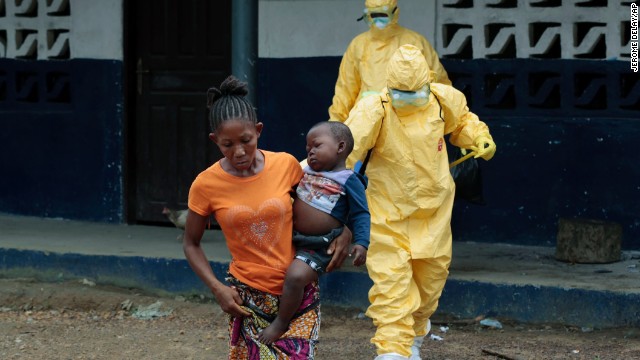 Marie Nyan, whose mother died of Ebola, carries her 2-year-old son, Nathaniel Edward, to an ambulance in the Liberian village of Freeman Reserve on Tuesday, September 30.
Marie Nyan, whose mother died of Ebola, carries her 2-year-old son, Nathaniel Edward, to an ambulance in the Liberian village of Freeman Reserve on Tuesday, September 30. 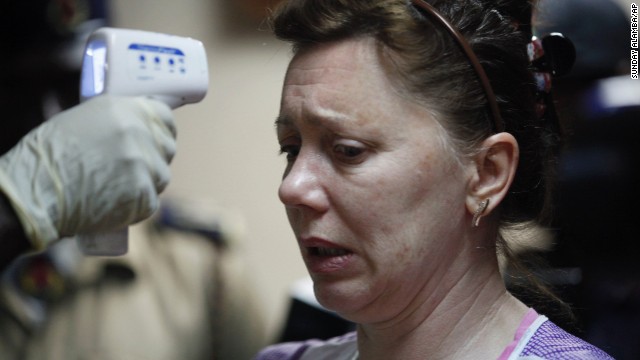 A health official uses a thermometer Monday, September 29, to screen a Ukrainian crew member on the deck of a cargo ship at the Apapa port in Lagos, Nigeria.
A health official uses a thermometer Monday, September 29, to screen a Ukrainian crew member on the deck of a cargo ship at the Apapa port in Lagos, Nigeria.  Children pray during Sunday service at the Bridgeway Baptist Church in Monrovia on Sunday, September 28.
Children pray during Sunday service at the Bridgeway Baptist Church in Monrovia on Sunday, September 28.  Residents of the St. Paul Bridge neighborhood in Monrovia take a man suspected of having Ebola to a clinic on September 28.
Residents of the St. Paul Bridge neighborhood in Monrovia take a man suspected of having Ebola to a clinic on September 28.  Workers move a building into place as part of a new Ebola treatment center in Monrovia on September 28.
Workers move a building into place as part of a new Ebola treatment center in Monrovia on September 28. 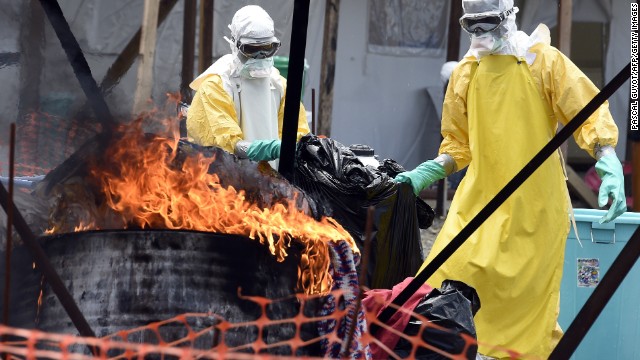 Medical staff members at the Doctors Without Borders facility in Monrovia burn clothes belonging to Ebola patients on Saturday, September 27.
Medical staff members at the Doctors Without Borders facility in Monrovia burn clothes belonging to Ebola patients on Saturday, September 27. 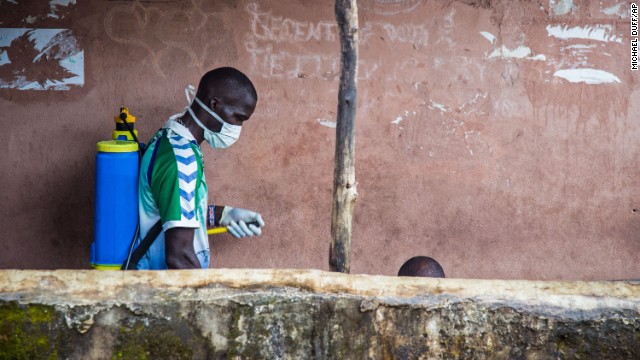 A health worker in Freetown, Sierra Leone, sprays disinfectant around the area where a man sits before loading him into an ambulance on Wednesday, September 24.
A health worker in Freetown, Sierra Leone, sprays disinfectant around the area where a man sits before loading him into an ambulance on Wednesday, September 24. 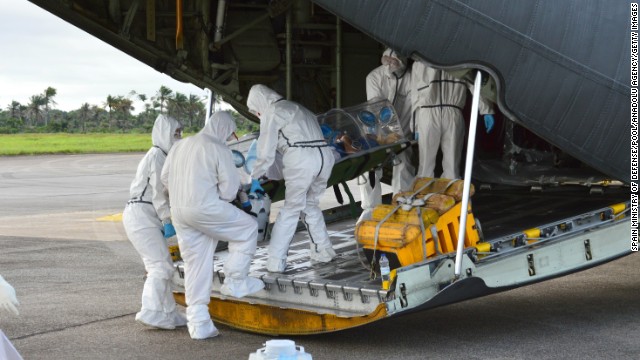 Medics load an Ebola patient onto a plane at Sierra Leone's Freetown-Lungi International Airport on Monday, September 22.
Medics load an Ebola patient onto a plane at Sierra Leone's Freetown-Lungi International Airport on Monday, September 22.  A few people are seen in Freetown during a three-day nationwide lockdown on Sunday, September 21. In an attempt to curb the spread of the Ebola virus, people in Sierra Leone were told to stay in their homes.
A few people are seen in Freetown during a three-day nationwide lockdown on Sunday, September 21. In an attempt to curb the spread of the Ebola virus, people in Sierra Leone were told to stay in their homes.  Supplies wait to be loaded onto an aircraft at New York's John F. Kennedy International Airport on Saturday, September 20. It was the largest single shipment of aid to the Ebola zone to date, and it was coordinated by the Clinton Global Initiative and other U.S. aid organizations.
Supplies wait to be loaded onto an aircraft at New York's John F. Kennedy International Airport on Saturday, September 20. It was the largest single shipment of aid to the Ebola zone to date, and it was coordinated by the Clinton Global Initiative and other U.S. aid organizations. 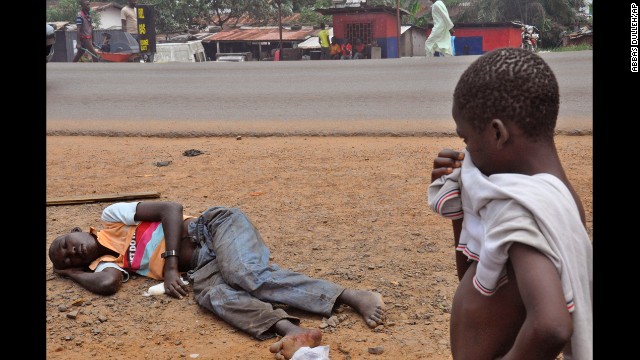 A child stops on a Monrovia street Friday, September 12, to look at a man who is suspected of suffering from Ebola.
A child stops on a Monrovia street Friday, September 12, to look at a man who is suspected of suffering from Ebola. 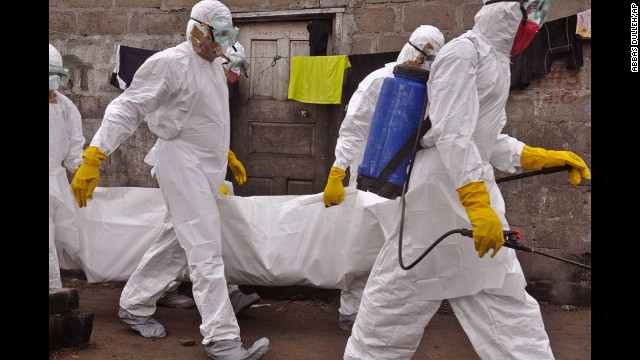 Health workers on Wednesday, September 10, carry the body of a woman who they suspect died from the Ebola virus in Monrovia.
Health workers on Wednesday, September 10, carry the body of a woman who they suspect died from the Ebola virus in Monrovia. 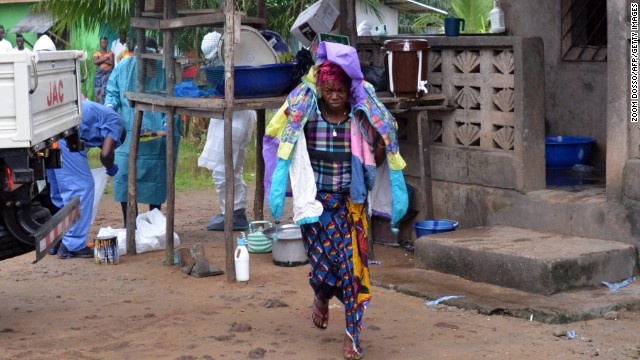 A woman in Monrovia carries the belongings of her husband, who died after he was infected by the Ebola virus.
A woman in Monrovia carries the belongings of her husband, who died after he was infected by the Ebola virus.  Health workers in Monrovia place a corpse into a body bag on Thursday, September 4.
Health workers in Monrovia place a corpse into a body bag on Thursday, September 4.  After an Ebola case was confirmed in Senegal, people load cars with household items as they prepare to cross into Guinea from the border town of Diaobe, Senegal, on Wednesday, September 3.
After an Ebola case was confirmed in Senegal, people load cars with household items as they prepare to cross into Guinea from the border town of Diaobe, Senegal, on Wednesday, September 3.  Crowds cheer and celebrate in the streets Saturday, August 30, after Liberian authorities reopened the West Point slum in Monrovia. The military had been enforcing a quarantine on West Point, fearing a spread of the Ebola virus.
Crowds cheer and celebrate in the streets Saturday, August 30, after Liberian authorities reopened the West Point slum in Monrovia. The military had been enforcing a quarantine on West Point, fearing a spread of the Ebola virus. 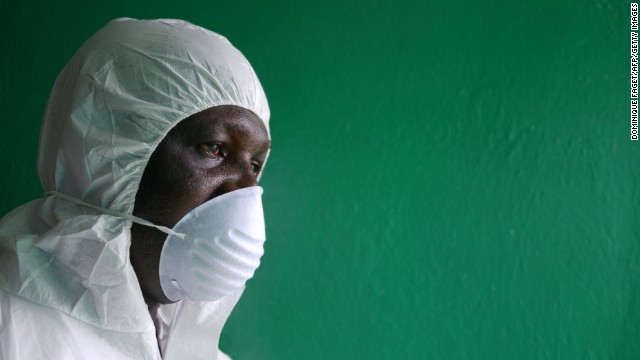 A health worker wearing a protective suit conducts an Ebola prevention drill at the port in Monrovia on Friday, August 29.
A health worker wearing a protective suit conducts an Ebola prevention drill at the port in Monrovia on Friday, August 29.  Volunteers working with the bodies of Ebola victims in Kenema, Sierra Leone, sterilize their uniforms on Sunday, August 24.
Volunteers working with the bodies of Ebola victims in Kenema, Sierra Leone, sterilize their uniforms on Sunday, August 24.  A guard stands at a checkpoint Saturday, August 23, between the quarantined cities of Kenema and Kailahun in Sierra Leone.
A guard stands at a checkpoint Saturday, August 23, between the quarantined cities of Kenema and Kailahun in Sierra Leone.  A burial team from the Liberian Ministry of Health unloads bodies of Ebola victims onto a funeral pyre at a crematorium in Marshall, Liberia, on Friday, August 22.
A burial team from the Liberian Ministry of Health unloads bodies of Ebola victims onto a funeral pyre at a crematorium in Marshall, Liberia, on Friday, August 22.  Dr. Kent Brantly leaves Emory University Hospital on Thursday, August 21, after being declared no longer infectious from the Ebola virus. Brantly was one of two American missionaries brought to Emory for treatment of the deadly virus.
Dr. Kent Brantly leaves Emory University Hospital on Thursday, August 21, after being declared no longer infectious from the Ebola virus. Brantly was one of two American missionaries brought to Emory for treatment of the deadly virus.  Family members of West Point district commissioner Miata Flowers flee the slum in Monrovia while being escorted by the Ebola Task Force on Wednesday, August 20.
Family members of West Point district commissioner Miata Flowers flee the slum in Monrovia while being escorted by the Ebola Task Force on Wednesday, August 20.  An Ebola Task Force soldier beats a local resident while enforcing a quarantine on the West Point slum on August 20.
An Ebola Task Force soldier beats a local resident while enforcing a quarantine on the West Point slum on August 20.  Local residents gather around a very sick Saah Exco, 10, in a back alley of the West Point slum on Tuesday, August 19. The boy was one of the patients that was pulled out of a holding center for suspected Ebola patients after the facility was overrun and closed by a mob on August 16. A local clinic then refused to treat Saah, according to residents, because of the danger of infection. Although he was never tested for Ebola, Saah's mother and brother died in the holding center.
Local residents gather around a very sick Saah Exco, 10, in a back alley of the West Point slum on Tuesday, August 19. The boy was one of the patients that was pulled out of a holding center for suspected Ebola patients after the facility was overrun and closed by a mob on August 16. A local clinic then refused to treat Saah, according to residents, because of the danger of infection. Although he was never tested for Ebola, Saah's mother and brother died in the holding center.  A burial team wearing protective clothing retrieves the body of a 60-year-old Ebola victim from his home near Monrovia on Sunday, August 17.
A burial team wearing protective clothing retrieves the body of a 60-year-old Ebola victim from his home near Monrovia on Sunday, August 17.  lija Siafa, 6, stands in the rain with his 10-year-old sister, Josephine, while waiting outside Doctors Without Borders' Ebola treatment center in Monrovia on August 17. The newly built facility will initially have 120 beds, making it the largest-ever facility for Ebola treatment and isolation.
lija Siafa, 6, stands in the rain with his 10-year-old sister, Josephine, while waiting outside Doctors Without Borders' Ebola treatment center in Monrovia on August 17. The newly built facility will initially have 120 beds, making it the largest-ever facility for Ebola treatment and isolation.  Brett Adamson, a staff member from Doctors Without Borders, hands out water to sick Liberians hoping to enter the new Ebola treatment center on August 17.
Brett Adamson, a staff member from Doctors Without Borders, hands out water to sick Liberians hoping to enter the new Ebola treatment center on August 17.  Workers prepare the new Ebola treatment center on August 17.
Workers prepare the new Ebola treatment center on August 17.  A body, reportedly a victim of Ebola, lies on a street corner in Monrovia on Saturday, August 16.
A body, reportedly a victim of Ebola, lies on a street corner in Monrovia on Saturday, August 16.  Liberian police depart after firing shots in the air while trying to protect an Ebola burial team in the West Point slum of Monrovia on August 16. A crowd of several hundred local residents reportedly drove away the burial team and their police escort. The mob then forced open an Ebola isolation ward and took patients out, saying the Ebola epidemic is a hoax.
Liberian police depart after firing shots in the air while trying to protect an Ebola burial team in the West Point slum of Monrovia on August 16. A crowd of several hundred local residents reportedly drove away the burial team and their police escort. The mob then forced open an Ebola isolation ward and took patients out, saying the Ebola epidemic is a hoax.  A crowd enters the grounds of an Ebola isolation center in the West Point slum on August 16. The mob was reportedly shouting, "No Ebola in West Point."
A crowd enters the grounds of an Ebola isolation center in the West Point slum on August 16. The mob was reportedly shouting, "No Ebola in West Point."  A health worker disinfects a corpse after a man died in a classroom being used as an Ebola isolation ward Friday, August 15, in Monrovia.
A health worker disinfects a corpse after a man died in a classroom being used as an Ebola isolation ward Friday, August 15, in Monrovia.  A boy tries to prepare his father before they are taken to an Ebola isolation ward August 15 in Monrovia.
A boy tries to prepare his father before they are taken to an Ebola isolation ward August 15 in Monrovia.  Kenyan health officials take passengers' temperature as they arrive at the Jomo Kenyatta International Airport on Thursday, August 14, in Nairobi, Kenya.
Kenyan health officials take passengers' temperature as they arrive at the Jomo Kenyatta International Airport on Thursday, August 14, in Nairobi, Kenya.  A hearse carries the coffin of Spanish priest Miguel Pajares after he died at a Madrid hospital on Tuesday, August 12. Pajares, 75, contracted Ebola while he was working as a missionary in Liberia.
A hearse carries the coffin of Spanish priest Miguel Pajares after he died at a Madrid hospital on Tuesday, August 12. Pajares, 75, contracted Ebola while he was working as a missionary in Liberia.  Health workers in Kenema screen people for the Ebola virus on Saturday, August 9, before they enter the Kenema Government Hospital.
Health workers in Kenema screen people for the Ebola virus on Saturday, August 9, before they enter the Kenema Government Hospital.  Paramedics in protective suits move Pajares, the infected Spanish priest, at Carlos III Hospital in Madrid on Thursday, August 7. He died five days later.
Paramedics in protective suits move Pajares, the infected Spanish priest, at Carlos III Hospital in Madrid on Thursday, August 7. He died five days later.  Nurses carry the body of an Ebola victim from a house outside Monrovia on Wednesday, August 6.
Nurses carry the body of an Ebola victim from a house outside Monrovia on Wednesday, August 6.  A Nigerian health official wears protective gear August 6 at Murtala Muhammed International Airport in Lagos.
A Nigerian health official wears protective gear August 6 at Murtala Muhammed International Airport in Lagos. 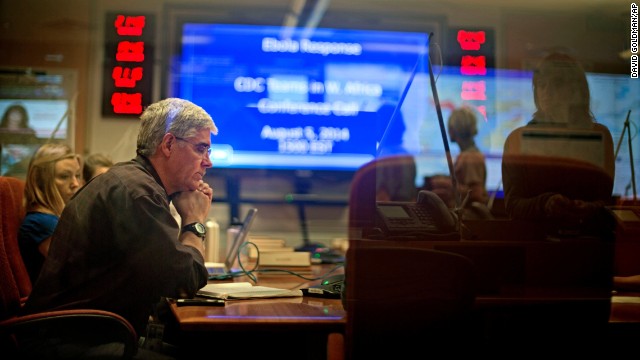 Officials with the Centers for Disease Control and Prevention in Atlanta sit in on a conference call about Ebola with CDC team members deployed in West Africa on Tuesday, August 5.
Officials with the Centers for Disease Control and Prevention in Atlanta sit in on a conference call about Ebola with CDC team members deployed in West Africa on Tuesday, August 5.  Aid worker Nancy Writebol, wearing a protective suit, gets wheeled on a gurney into Emory University Hospital in Atlanta on August 5. A medical plane flew Writebol from Liberia to the United States after she and her colleague Dr. Kent Brantly were infected with the Ebola virus in the West African country.
Aid worker Nancy Writebol, wearing a protective suit, gets wheeled on a gurney into Emory University Hospital in Atlanta on August 5. A medical plane flew Writebol from Liberia to the United States after she and her colleague Dr. Kent Brantly were infected with the Ebola virus in the West African country.  Nigerian health officials are on hand to screen passengers at Murtala Muhammed International Airport on Monday, August 4.
Nigerian health officials are on hand to screen passengers at Murtala Muhammed International Airport on Monday, August 4.  Nurses wearing protective clothing are sprayed with disinfectant Friday, August 1, in Monrovia after they prepared the bodies of Ebola victims for burial.
Nurses wearing protective clothing are sprayed with disinfectant Friday, August 1, in Monrovia after they prepared the bodies of Ebola victims for burial.  A nurse disinfects the waiting area at the ELWA Hospital in Monrovia on Monday, July 28.
A nurse disinfects the waiting area at the ELWA Hospital in Monrovia on Monday, July 28.  In this photo provided by Samaritan's Purse, Dr. Kent Brantly, left, treats an Ebola patient in Monrovia. On July 26, the North Carolina-based group said Brantly tested positive for the disease. Days later, Brantly arrived in Georgia to be treated at an Atlanta hospital, becoming the first Ebola patient to knowingly be treated in the United States.
In this photo provided by Samaritan's Purse, Dr. Kent Brantly, left, treats an Ebola patient in Monrovia. On July 26, the North Carolina-based group said Brantly tested positive for the disease. Days later, Brantly arrived in Georgia to be treated at an Atlanta hospital, becoming the first Ebola patient to knowingly be treated in the United States. 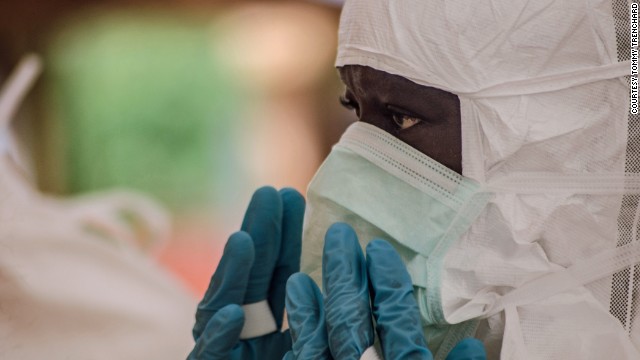 A doctor puts on protective gear at the treatment center in Kailahun on Sunday, July 20.
A doctor puts on protective gear at the treatment center in Kailahun on Sunday, July 20.  Members of Doctors Without Borders adjust tents in the isolation area in Kailahun on July 20.
Members of Doctors Without Borders adjust tents in the isolation area in Kailahun on July 20. 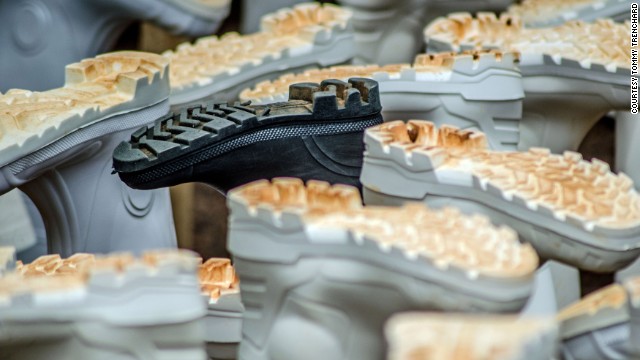 Boots dry in the Ebola treatment center in Kailahun on July 20.
Boots dry in the Ebola treatment center in Kailahun on July 20.  Dr. Jose Rovira of the World Health Organization takes a swab from a suspected Ebola victim in Pendembu, Sierra Leone, on Friday, July 18.
Dr. Jose Rovira of the World Health Organization takes a swab from a suspected Ebola victim in Pendembu, Sierra Leone, on Friday, July 18.  Red Cross volunteers disinfect each other with chlorine after removing the body of an Ebola victim from a house in Pendembu on July 18.
Red Cross volunteers disinfect each other with chlorine after removing the body of an Ebola victim from a house in Pendembu on July 18.  A doctor works in the field laboratory at the Ebola treatment center in Kailahun on Thursday, July 17.
A doctor works in the field laboratory at the Ebola treatment center in Kailahun on Thursday, July 17.  Doctors Without Borders staff prepare to enter the isolation ward at an Ebola treatment center in Kailahun on July 17.
Doctors Without Borders staff prepare to enter the isolation ward at an Ebola treatment center in Kailahun on July 17.  Dr. Mohamed Vandi of the Kenema Government Hospital trains community volunteers who will aim to educate people about Ebola in Sierra Leone.
Dr. Mohamed Vandi of the Kenema Government Hospital trains community volunteers who will aim to educate people about Ebola in Sierra Leone.  A woman has her temperature taken at a screening checkpoint on the road out of Kenema on Wednesday, July 9.
A woman has her temperature taken at a screening checkpoint on the road out of Kenema on Wednesday, July 9.  A member of Doctors Without Borders puts on protective gear at the isolation ward of the Donka Hospital in Conakry on Saturday, June 28.
A member of Doctors Without Borders puts on protective gear at the isolation ward of the Donka Hospital in Conakry on Saturday, June 28.  Airport employees check passengers in Conakry before they leave the country on Thursday, April 10.
Airport employees check passengers in Conakry before they leave the country on Thursday, April 10.  A Guinea-Bissau customs official watches arrivals from Conakry on Tuesday, April 8.
A Guinea-Bissau customs official watches arrivals from Conakry on Tuesday, April 8.  Egidia Almeida, a nurse in Guinea-Bissau, scans a Guinean citizen coming from Conakry on April 8.
Egidia Almeida, a nurse in Guinea-Bissau, scans a Guinean citizen coming from Conakry on April 8.  A scientist separates blood cells from plasma cells to isolate any Ebola RNA and test for the virus Thursday, April 3, at the European Mobile Laboratory in Gueckedou, Guinea.
A scientist separates blood cells from plasma cells to isolate any Ebola RNA and test for the virus Thursday, April 3, at the European Mobile Laboratory in Gueckedou, Guinea. 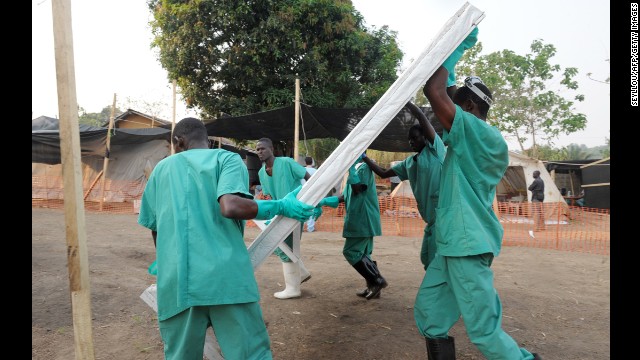 Health specialists work Monday, March 31, at an isolation ward for patients at the facility in southern Guinea.
Health specialists work Monday, March 31, at an isolation ward for patients at the facility in southern Guinea.  Photos: The Ebola epidemic
Photos: The Ebola epidemic Asked what she'd tell Hickox, Mayhew said, "We have been pleading for common sense, for an appreciation for the risks that exists." She pointed to other states such as New Jersey, New York and Illinois that have implemented 21-day quarantines for health care workers returning from West Africa, over objections from some medical professionals and federal officials.
The health commissioner said she "did not understand" why Hickox is challenging what she calls a "common-sense approach" of staying home for three weeks. (That amount of time is significant because it may take that long between when a person gets Ebola and shows signs of it.)
"(This is) a reasonable request to ensure -- out of an abundance of caution -- that we are protecting the people of this state," Mayhew said.
Yet Hickox thinks the U.S. Constitution and science are on her side.
And, because of that, she doesn't plan to stay put.
"I don't plan on sticking to the guidelines," she said Wednesday on NBC's "Today" show, referring to Maine' officials' plan for her to remain quarantined at home through November 10. "I remain appalled by these home quarantine policies that have been forced upon me."
Complete coverage on Ebola
'I remain appalled by these home quarantine policies'
Earlier this month, Hickox served with Doctors Without Borders in Sierra Leone, one of the three countries hit hardest by the ongoing Ebola epidemic. She returned to the United States, at Liberty International Airport in Newark, New Jersey, on October 24 -- then was sent to University Hospital in the same northern New Jersey city and put under quarantine.
On Monday, she was back home to her home in Fort Kent, a town of 4,000 people on Maine's northern border.
Hickox insists that, from her arrival through now, she has felt fine and that she's twice tested negative for Ebola. And since people can't spread the virus unless they are displaying symptoms, the nurse believes she doesn't pose a risk to anyone.
One of her lawyers, Norm Siegel, told CNN any measure that restricts his client's movement is "based ... on fear and on myth, not on medical fact."
"The government can't take away your liberty unless there's some compelling basis for it," Siegel said. "It doesn't exist there."
For that reason, Siegel said that Hickox "is not going to agree to the restrictions that they placed on her. If they get a court order, then we will challenge it."
While he didn't mention Hickox's case specifically, President Barack Obama on Wednesday did speak to -- and in support of -- health care workers like her who risked their lives and livelihoods by going to West Africa to help those in need. He characterized them as "heroes" who "deserve to be treated with dignity and respect."
Marco Rubio: Quarantined nurse is a 'hero'
He also criticized those championing policies such as quarantines and travel bans, saying that America should firstly be praising, encouraging and supporting health care workers critical to curbing the Ebola epidemic rather than antagonizing them.
"When I hear people talking about American leadership and then are promoting policies that would avoid leadership and have us running in the opposite direction and hiding under the covers, it makes me a little frustrated," Obama said.
 Mandatory Ebola quarantine for military
Mandatory Ebola quarantine for military  Christie: 'No regrets' over quarantine
Christie: 'No regrets' over quarantine  Quarantined American: I'm in disbelief
Quarantined American: I'm in disbelief 
 Thomas Eric Duncan was a Liberian resident who flew to Dallas to visit family and friends in September. He became ill after the flight and was hospitalized on September 28, becoming the first Ebola patient diagnosed in the United States. He died on October 8.
Thomas Eric Duncan was a Liberian resident who flew to Dallas to visit family and friends in September. He became ill after the flight and was hospitalized on September 28, becoming the first Ebola patient diagnosed in the United States. He died on October 8.  Amber Vinson was one of two nurses diagnosed with Ebola after treating Liberian patient Thomas Eric Duncan in Dallas. She was released from Atlanta's Emory University Hospital on October 28 -- two weeks after she was hospitalized in Dallas and 13 days after she was transferred to Emory.
Amber Vinson was one of two nurses diagnosed with Ebola after treating Liberian patient Thomas Eric Duncan in Dallas. She was released from Atlanta's Emory University Hospital on October 28 -- two weeks after she was hospitalized in Dallas and 13 days after she was transferred to Emory. 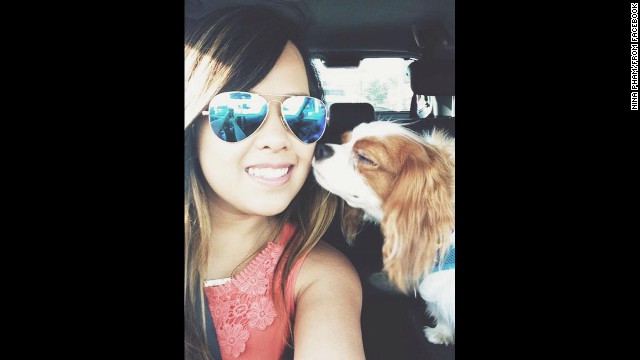 Nina Pham is a nurse who also treated Thomas Eric Duncan at a Dallas hospital. Pham tested positive for Ebola on October 11, three days before her colleague Amber Vinson. She eventually was treated at a National Institutes of Health facility in Maryland, which declared her Ebola-free on October 24.
Nina Pham is a nurse who also treated Thomas Eric Duncan at a Dallas hospital. Pham tested positive for Ebola on October 11, three days before her colleague Amber Vinson. She eventually was treated at a National Institutes of Health facility in Maryland, which declared her Ebola-free on October 24. 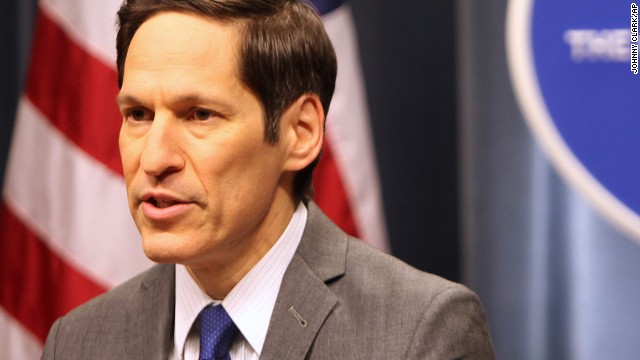 Dr. Tom Frieden, director of the Centers for Disease Control and Prevention in Atlanta, has led the effort to evacuate and treat American patients. He has also helped U.S. hospitals prepare for a possible outbreak at home. The CDC has teams working in West Africa assisting with contact tracing and infection control.
Dr. Tom Frieden, director of the Centers for Disease Control and Prevention in Atlanta, has led the effort to evacuate and treat American patients. He has also helped U.S. hospitals prepare for a possible outbreak at home. The CDC has teams working in West Africa assisting with contact tracing and infection control.  Dr. Kent Brantly contracted Ebola while working as the medical director for Samaritan's Purse Ebola Care Center in Monrovia, Liberia, in July. He was the first person to be treated with the experimental drug ZMapp, and he was the first patient to be brought to the United States. Treatment at Atlanta's Emory University Hospital started on August 2, and he was released on August 21.
Dr. Kent Brantly contracted Ebola while working as the medical director for Samaritan's Purse Ebola Care Center in Monrovia, Liberia, in July. He was the first person to be treated with the experimental drug ZMapp, and he was the first patient to be brought to the United States. Treatment at Atlanta's Emory University Hospital started on August 2, and he was released on August 21. 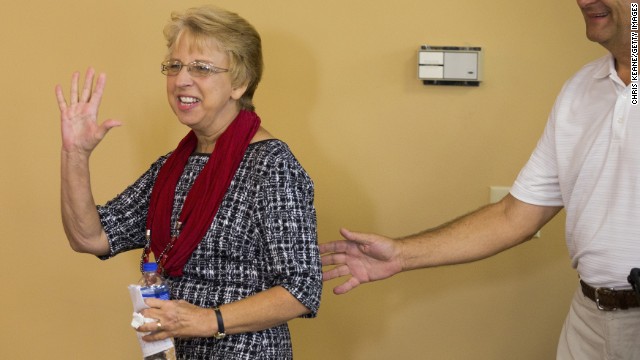 Nancy Writebol, an American missionary, tested positive for Ebola in Liberia in July. She was flown to Atlanta's Emory University Hospital, arriving on August 6, and she was released on August 19.
Nancy Writebol, an American missionary, tested positive for Ebola in Liberia in July. She was flown to Atlanta's Emory University Hospital, arriving on August 6, and she was released on August 19.  Dr. Margaret Chan has been the World Health Organization's director-general since 2006. Originally from China, she has a strong background in communicable diseases and infection control.
Dr. Margaret Chan has been the World Health Organization's director-general since 2006. Originally from China, she has a strong background in communicable diseases and infection control. 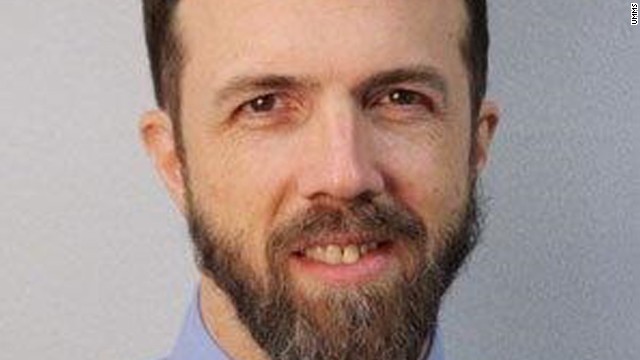 American Dr. Rick Sacra was delivering babies in a hospital in Liberia when he contracted Ebola. He tested positive in Liberia on September 1 and was eventually flown to the United States, where he became the first Ebola patient to be treated at the Nebraska Medical Center's biocontainment unit. He was declared Ebola-free on September 25.
American Dr. Rick Sacra was delivering babies in a hospital in Liberia when he contracted Ebola. He tested positive in Liberia on September 1 and was eventually flown to the United States, where he became the first Ebola patient to be treated at the Nebraska Medical Center's biocontainment unit. He was declared Ebola-free on September 25.  American Ashoka Mukpo is a freelance cameraman who was working for NBC News in Liberia when he became ill with Ebola symptoms. He was flown to the Nebraska Medical Center on October 6, and he was declared Ebola-free on October 21.
American Ashoka Mukpo is a freelance cameraman who was working for NBC News in Liberia when he became ill with Ebola symptoms. He was flown to the Nebraska Medical Center on October 6, and he was declared Ebola-free on October 21. 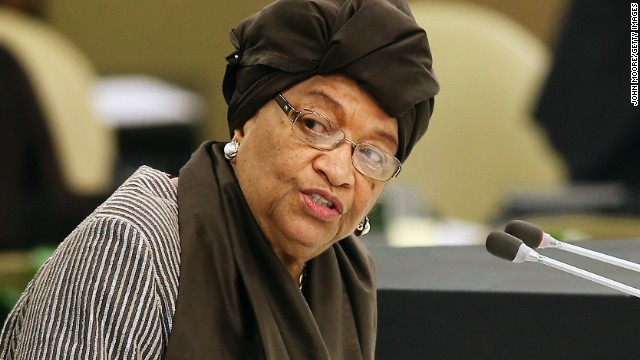 Liberian President Ellen Johnson Sirleaf has been very outspoken about the international community's response to the Ebola outbreak in West Africa. Liberia has had the most cases and deaths of all the countries affected by the outbreak.
Liberian President Ellen Johnson Sirleaf has been very outspoken about the international community's response to the Ebola outbreak in West Africa. Liberia has had the most cases and deaths of all the countries affected by the outbreak. 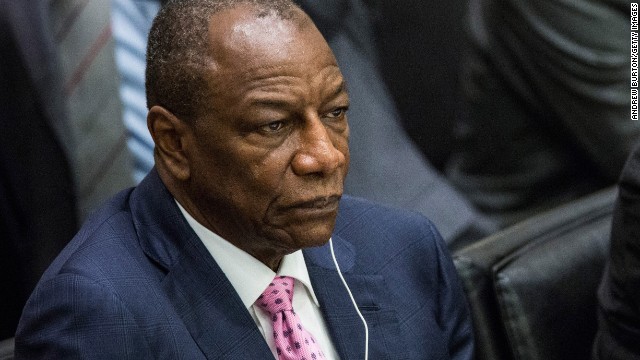 Alpha Conde is the president of Guinea, which has had more than 1,100 cases, including 739 deaths.
Alpha Conde is the president of Guinea, which has had more than 1,100 cases, including 739 deaths. 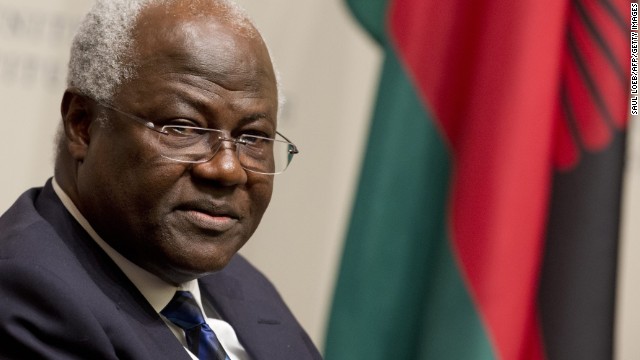 Ernest Bai Koroma is the president of Sierra Leone, which has had more than 2,400 cases, including 623 deaths.
Ernest Bai Koroma is the president of Sierra Leone, which has had more than 2,400 cases, including 623 deaths.  The well-known Dr. Sheik Humarr Khan, left, died after contracting Ebola while helping patients in Sierra Leone.
The well-known Dr. Sheik Humarr Khan, left, died after contracting Ebola while helping patients in Sierra Leone. 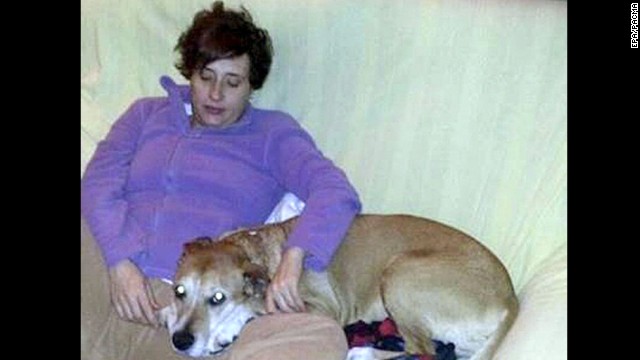 A nurse's assistant, Teresa Romero Ramos, tested positive for Ebola after treating a Spanish missionary in Madrid. Her case was the first recorded transmission of Ebola outside of West Africa for this particular outbreak. She was treated and later declared Ebola-free.
A nurse's assistant, Teresa Romero Ramos, tested positive for Ebola after treating a Spanish missionary in Madrid. Her case was the first recorded transmission of Ebola outside of West Africa for this particular outbreak. She was treated and later declared Ebola-free. 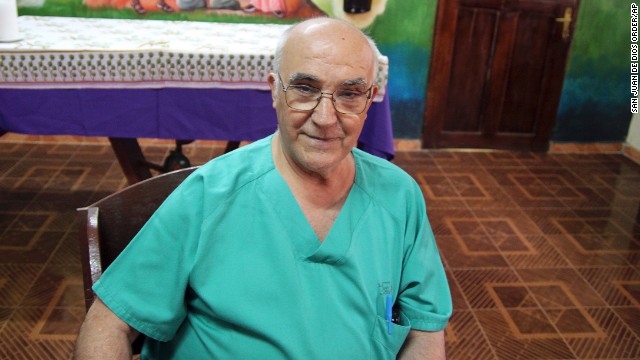 Spanish priest Manuel Garcia Viejo was diagnosed with Ebola while working in Sierra Leone. He was flown back to Spain for treatment before he died.
Spanish priest Manuel Garcia Viejo was diagnosed with Ebola while working in Sierra Leone. He was flown back to Spain for treatment before he died. 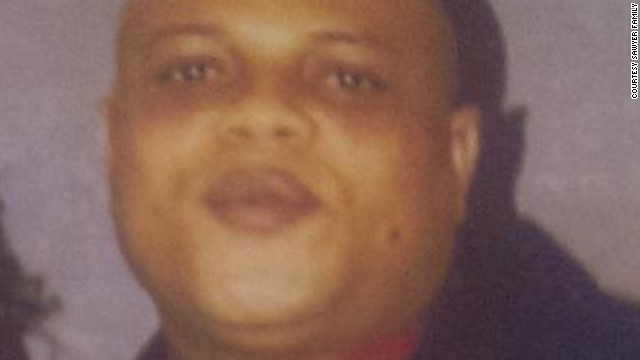 Patrick Sawyer collapsed after getting off a plane in Lagos, Nigeria, and later died. Health officials believe he was the start of the small outbreak in that country.
Patrick Sawyer collapsed after getting off a plane in Lagos, Nigeria, and later died. Health officials believe he was the start of the small outbreak in that country. Who's who in the Ebola outbreak?
Who's who in the Ebola outbreak?
Who's who in the Ebola outbreak?
Who's who in the Ebola outbreak?
Who's who in the Ebola outbreak?
Who's who in the Ebola outbreak?
Who's who in the Ebola outbreak?
Who's who in the Ebola outbreak?
Who's who in the Ebola outbreak?
Who's who in the Ebola outbreak?
Who's who in the Ebola outbreak?
Who's who in the Ebola outbreak?
Who's who in the Ebola outbreak?
Who's who in the Ebola outbreak?
Who's who in the Ebola outbreak?
Who's who in the Ebola outbreak?
 Who's who in the Ebola outbreak?
Who's who in the Ebola outbreak? New Jersey governor on lawsuit: 'Get in line'
The nurse told "Today" that she's in good health and does not have symptoms. A person must be symptomatic to be contagious if they have Ebola. But it can take up to three weeks between when a person contracts the virus and they become sick, hence the talk of a 21-day quarantine.
Siegel told the Bangor Daily News that, while Hickox would contest any court order, she will abide by guidelines from the U.S. Centers for Disease Control and Prevention that say she should subject herself to monitoring, such as daily reporting of measured temperatures.
"The conditions that the state of Maine is now requiring Kaci to comply with are unconstitutional and illegal and there is no justification for the state of Maine to infringe on her liberty," Siegel told the newspaper.
Hickox initially was put in isolation Friday, after landing in Newark, New Jersey.
New Jersey and New York had just started requiring anyone who had contact with Ebola patients in West Africa to be quarantined for 21 days. New Jersey officials additionally said that screeners determined that she had a fever at the airport.
But Hickox, speaking to CNN over the weekend from her quarantine tent at the New Jersey hospital, said she never had a fever.
"They were using a forehead scanner, and I was distressed and a little bit upset, and so my cheeks were flushed," she told CNN's Candy Crowley. The nurse said her temperature was later determined to be normal.
Hickox told "Today" that she witnessed "complete disorganization" at the airport in Newark, New Jersey, and that New York and New Jersey's policies are "not scientifically" or "constitutionally just."
The policies, she says, will be a "big deterrent" for health care workers who want to go to West Africa to treat patients, because they won't want to be quarantined when they return if, like her, they are asymptomatic.
"It's already difficult for people to take time out of their lives to go and respond," she said, though she definitely plans to go back because it's a "privilege to help."
Ebola survivor: Christie is 'playing politics'
New Jersey Gov. Chris Christie said his state agreed to let her go to Maine after confirming she "was no longer symptomatic," but he is unapologetic about New Jersey's quarantine policy. The straight-talking Republican also hit back Tuesday at criticism that the nurse wasn't treated well enough, arguing that she even had Internet access and takeout food.
"Whatever," he said, when pressed by reporters about a potential legal challenge. "Get in line. I've been sued lots of times before. Get in line. I'm happy to take it on."
Christie on possible Ebola lawsuit: 'Whatever'
The debate about how to treat returning health care workers comes amid what officials say is the worst Ebola outbreak in history.
The World Health Organization reported Wednesday that there are more than 13,700 confirmed or suspected cases of Ebola -- almost all in Guinea, Liberia and Sierra Leone. The United Nations' health authority projected about 5,000 deaths from the virus.
And those are only the ones that authorities have been able to count. In a region where health care access and record-keeping are limited, the WHO says the death toll may be especially undercounted. Some ill people who are seen by physicians and counted as Ebola cases may not stay for treatment and die of the disease, and the record-keepers won't know to record their deaths.
The WHO has said that the mortality rate from the current outbreak, starting with the first death in December, is roughly 60% to 70%.
Connecticut girl barred from school amid Ebola fears; family sues
CNN's Ashley Fantz, Ashley Killough and Ray Sanchez contributed to this report.

0 comments:
Post a Comment